Marty Nemko's Blog, page 416
February 19, 2014
Days of Our Work Lives: Part III: Adam's Saga. Episode 6: The College Admission Frenzy
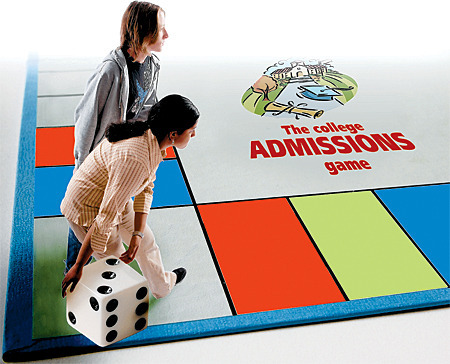 Days of Our Work LivesPart III: Adam's Story
Days of Our Work LivesPart III: Adam's StoryEpisode 6:The College Admission Frenzy
In the previous episode, Adam's bicycling accident resulted in a trip to the optometrist, where he finally found a career he could be excited about.
He set his sights on colleges that offered a 7-year combined bachelor's and Doctor of Optometry program but those are quite selective. Adam's GPA nor his SAT score were exceptional, despite having taken an SAT prep course.
A side note: He had felt pressure to take the SAT prep course from peer and parent exhortations, which in turn are fueled by fear-mongering by SAT prep companies and by colleges' deceptive implications that admission is more selective than it is. In fact, SAT prep courses have only an insignificant average effect on score. Importantly, even if an SAT prep course did result in a student getting into a notch more selective college, there is no evidence that would result in more student learning or even employment enhancement. In fact, there's reason to believe that being a bigger fish in a less-selective pond would help more: a higher GPA, more leadership opportunities, etc. But the college-search frenzy suppresses reason.
That frenzy also made Adam search for an extracurricular activity that would impress the colleges. It would have made sense for him to volunteer at an optometrist's office but, "Mom, that doesn't feel sexy enough."
Susan replied, "Okay, I guess. Why don't you run for school treasurer? You're good with numbers and I've really benefited and feel I'm making a contribution as treasurer at Rotary."
Teenagers usually dismiss parents' advice--part of their attempt to become an autonomous adult. But this time, he agreed. "Running for office sounds cool, and it'll look good on my college applications." Susan sighed but wasn't brave enough to tell Adam what she was thinking: "How easily students will prostitute themselves merely to get into a college that's a notch more selective. God knows what he'll do to get ahead in his career."
A side note: Children often imitate their parents, including choosing their career but that only partly explains why so many kids follow in their parents' footsteps. Parents pass on their genetics, give their child inside information, and can open doors in that career. Unfortunately, parents are often criticized for encouraging their kids to look at a parent's career. Typical criticism: "Put your ego aside and don't push your kid to do what you do. Let him find what he likes." But this writer believes that criticism is wrong. If a parent believes the child might be well-suited in his or her career, it's wise to encourage, although not pressure, their child to consider it.
Alas, Adam would not win the election. He was earnest, cognitive rather than emotional, and not socially adept. He lost in a landslide to a popular class clown whose platform was to steal money from rich kids to give to the poor... and to put a coke machine in the hallway.
Adam still needed an extracurricular.
The next episode is HERE.
Published on February 19, 2014 14:10
Days of Our Worklives: an unvarnished look at work today. Part III: Adam's Story. Episode 5: Stick That in Your Eye!
Days of Our Work LivesPart III: Adam's Saga
Episode 5Stick That In Your Eye!
In the previous episode, Adam left the career fair wondering if there really were any good careers left.

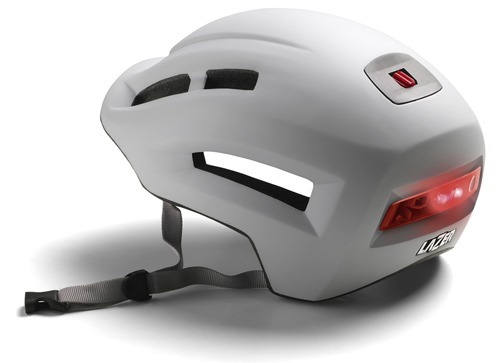

He put on his reflective jacket and helmet with built-in taillight, got on his reflective bike, turned on the flashing LED headlight, and headed home, musing on what the hell he wanted to be when he grew up.
 Despite musing, Adam was paying attention, really. But when the car door opened right into his bike, Adam could not have avoided it. The door knocked Adam off his bike, with his eye landing right onto the narrow end of the headlight. A direct hit.
Despite musing, Adam was paying attention, really. But when the car door opened right into his bike, Adam could not have avoided it. The door knocked Adam off his bike, with his eye landing right onto the narrow end of the headlight. A direct hit.
Fortunately, after just a few seconds, his vision returned to normal and he was otherwise fine but Susan and Ben insisted he go to the optometrist just to be sure. They looked on Yelp and found the highest-rated local optometrist that had lots of reviews. Anyone could have a shill write one or two positive reviews or a competitor could write a negative one to try to destroy him or her. But someone with a lot of ratings, mainly 5-star, plus detailed narrative reviews, is a good bet. Dr. Michaels was an hour away in Seattle but everyone agreed it was worth it.
In the waiting room, Adam was somehow scared. And he wasn't put at ease when Dr. Michaels came out. While professional, he wasn't exactly warm, nor was Adam calmed when Michaels put Adam in a machine that "will make a map of your retina."

But after the exam, Dr. Michaels said, "Everything is perfectly normal." Then Adam relaxed and asked, "Could you fit me for contact lenses? Glasses are dorky. Girls don't like them."
Dr. Michaels tried various lenses: "Better lens 1 or 2?" until they seemed so similar that Adam couldn't tell and, again, he felt stupid.
At the end, when Dr. Michaels was writing the lens prescription, Adam was now fully relaxed and reflecting on the experience: He was fascinated by what Dr. Michaels did: all the gadgets, the precision, and that he could, just by writing a prescription, make you see perfectly, and without glasses. And you didn't have to be super socially polished and you can still get 5-star ratings.
So Adam decided to ask Dr. Michaels about his career. Nearly everyone likes to talk about their career, especially if they're good at it, so Michaels was pleased when Adam asked, "I'm thinking about becoming an optometrist. What's best and worst about it?"
He replied, "You help nearly every patient, there are few night emergencies, pay is good, there's prestige, it's low stress, and the technology is always improving so you can help more people. The only bad part is it requires a lot of school: 4 years of college and 4 years to get your Doctor of Optometry, although there are 7-year combined programs."
When Adam returned to the waiting room and the anxiously awaiting Ben and Susan, he was smiling. "I think I want to be an optometrist. Oh and I'm getting contact lenses!"
Susan asked, "Are you sure you'll take care of them? You're not exactly the neatest person in the world."
"I will. I will.'
Ben asked, "Are you sure you won't lose them?"
"I won't. I promise."
The next episode is HERE.
Episode 5Stick That In Your Eye!
In the previous episode, Adam left the career fair wondering if there really were any good careers left.



He put on his reflective jacket and helmet with built-in taillight, got on his reflective bike, turned on the flashing LED headlight, and headed home, musing on what the hell he wanted to be when he grew up.
 Despite musing, Adam was paying attention, really. But when the car door opened right into his bike, Adam could not have avoided it. The door knocked Adam off his bike, with his eye landing right onto the narrow end of the headlight. A direct hit.
Despite musing, Adam was paying attention, really. But when the car door opened right into his bike, Adam could not have avoided it. The door knocked Adam off his bike, with his eye landing right onto the narrow end of the headlight. A direct hit. Fortunately, after just a few seconds, his vision returned to normal and he was otherwise fine but Susan and Ben insisted he go to the optometrist just to be sure. They looked on Yelp and found the highest-rated local optometrist that had lots of reviews. Anyone could have a shill write one or two positive reviews or a competitor could write a negative one to try to destroy him or her. But someone with a lot of ratings, mainly 5-star, plus detailed narrative reviews, is a good bet. Dr. Michaels was an hour away in Seattle but everyone agreed it was worth it.
In the waiting room, Adam was somehow scared. And he wasn't put at ease when Dr. Michaels came out. While professional, he wasn't exactly warm, nor was Adam calmed when Michaels put Adam in a machine that "will make a map of your retina."

But after the exam, Dr. Michaels said, "Everything is perfectly normal." Then Adam relaxed and asked, "Could you fit me for contact lenses? Glasses are dorky. Girls don't like them."
Dr. Michaels tried various lenses: "Better lens 1 or 2?" until they seemed so similar that Adam couldn't tell and, again, he felt stupid.
At the end, when Dr. Michaels was writing the lens prescription, Adam was now fully relaxed and reflecting on the experience: He was fascinated by what Dr. Michaels did: all the gadgets, the precision, and that he could, just by writing a prescription, make you see perfectly, and without glasses. And you didn't have to be super socially polished and you can still get 5-star ratings.
So Adam decided to ask Dr. Michaels about his career. Nearly everyone likes to talk about their career, especially if they're good at it, so Michaels was pleased when Adam asked, "I'm thinking about becoming an optometrist. What's best and worst about it?"
He replied, "You help nearly every patient, there are few night emergencies, pay is good, there's prestige, it's low stress, and the technology is always improving so you can help more people. The only bad part is it requires a lot of school: 4 years of college and 4 years to get your Doctor of Optometry, although there are 7-year combined programs."
When Adam returned to the waiting room and the anxiously awaiting Ben and Susan, he was smiling. "I think I want to be an optometrist. Oh and I'm getting contact lenses!"
Susan asked, "Are you sure you'll take care of them? You're not exactly the neatest person in the world."
"I will. I will.'
Ben asked, "Are you sure you won't lose them?"
"I won't. I promise."
The next episode is HERE.
Published on February 19, 2014 12:09
This blog now has had over 1 million page views. Thank you!
I'm pleased to say that as of today, this blog has now received over 1,000,000 page views on top of 1.5 million on my website: www.martynemko.com. Having a substantial readership so adds to my life's meaning.
I'm especially honored that you've chosen to read my work because the internet provides an infinite number of other choices.
I particularly want to thank the commenters. Except for one person who relentlessly tries to tear me down personally, you've all been wonderful, not just the supportive ones but those of you who have disagreed with me and made a constructive comment.
I promise to continue to try my best to make it worth your reading my work.
Marty
I'm especially honored that you've chosen to read my work because the internet provides an infinite number of other choices.
I particularly want to thank the commenters. Except for one person who relentlessly tries to tear me down personally, you've all been wonderful, not just the supportive ones but those of you who have disagreed with me and made a constructive comment.
I promise to continue to try my best to make it worth your reading my work.
Marty
Published on February 19, 2014 01:13
Days of Our Work Lives: Part III; Adam's Saga. Episode 4: Are There Any Good Careers Left?
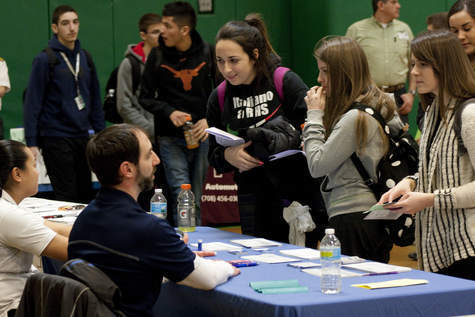 Days of Our WorklivesPart III: Adam's SagaEpisode 4Are There Any Good Careers Left?
Days of Our WorklivesPart III: Adam's SagaEpisode 4Are There Any Good Careers Left?In the previous episode, Susan and Ben tried to jump-start Adam's career exploration while he was still in middle school. To no avail.
But high school was to be different.
His high school experience didn't get off to an auspicious start. An upperclassman stopped the gaping freshman and said, "Hey, have you seen the swimming pool yet? It's cool! Just go up the stairs to the stairs to the very top." He walked the seven flights to find only an old storage closet. Welcome to the Lincoln High School "community."
Adam had always had a good number sense. For example, when he and his mom were in the supermarket, she'd pick a wedge of cheese, tell him it, for example, weighed .56 pounds and was $6.99 a pound, and in his head, Adam would nearly instantly, get within a nickel of the price. Yet somehow, perhaps because he wasn't developmentally ready, he nearly failed Algebra 1. He felt stupid. And even though he went on to get an A in Geometry and an A- in Algebra II, that failure stayed with him--he felt that if he were intelligent, he wouldn't have gotten a D in Algebra 1.
In his junior year, he attended career day, hopeful he'd come up with a career goal--as much to relieve his parents as for himself.
With his interest in the Middle East, he joined the long line at the State Department booth. But the representative informed him, "Foreign Service Officers don't get to choose their country and with 200 countries, you're more likely to end up in an Azerbaijan or Burkina Faso than a France or Italy. And you have to learn the language. Urdu anyone? Plus despite the Foreign Service exam being very demanding, your first two years will be likely be spent mostly on menial tasks such as processing visa applications." Nope
Then he went to the police officer. He said, "It's nonstop pressure, except when there's paperwork. There's the routine pressure of being sure your speeding tickets are of the right racial ratio. Then there are the routine car and home alarms, which almost always are false alarms yet require 15 minutes of paperwork. Next most common are domestic disputes--You're going into dangerous buildings with the couple screaming and once, the guy was behind the door with a knife. The overwhelming majority of us are good cops but the way the media treats us, the community thinks of us as pigs to be scared of or even spit at--and we can't do anything about it except fill out silly paperwork. Cops are people of action, not of paperwork. Being a cop ain't what it used to be." Nope.
The lawyer said, "It used to be a high-minded profession. But with the pressure for more wins to get more billable hours, ethics sometimes takes a backseat to chicanery. And speaking of billable hours, they're expecting 2,100, 2,200, which means you'll spend a lot of time sleeping on an office futon." Nope.
The doctor said, "It's almost impossible to keep up with all the advances. So when patients come in waving internet printouts saying they know more than I do, sometimes they're right. And then there are the non-compliant patients: Tell them to take a pill, they don't take it. Tell them to stop smoking, they don't stop. Then they sue you. Malpractice insurance may cover the costs but the stress of a suit is terrible. But worst of all are the complicated and contradictory rules and paperwork: the federal, state, and local regulations, plus the insurance company's. It isn't easy being a doctor." Nope.
Adam walked out of the career fair feeling there were no good careers left.
Yet of all things, a bicycling accident, led him to a great one.
The next episode is HERE.
Published on February 19, 2014 00:53
February 18, 2014
Days of Our Worklives: Part III: Adam's Saga. Episode 3: Early Career Clues?
 Days of Our WorklivesPart III: Adam's Saga
Days of Our WorklivesPart III: Adam's SagaEpisode 3Early Career Clues?
In the previous episode, Ben and Susan had their biggest fight ever: about how much to try to tame Adam's "natural maleness." Indeed the school was trying: A strong case can now be made that school is not boy-friendly.
Adam was really helped by Susan convincing the school to let him skip the 5th grade, going straight from 4th to 6th. With Adam now on Ritalin and willing and able to be compliant, the school could no longer blame his boredom on ADHD.
Indeed, for most of the school day, Adam had good reason to be bored. With teachers rewarded and punished mainly for raising low-achievers' performance and not for helping above-average kids live up to their potential, most teachers allocate little time to meeting the needs of kids like Adam. The easiest thing for the school to do was let such kids skip a grade and enter middle school early. And that's what they did with Adam--It was good for him and made the teacher's life easier.
Having struggled with their careers, Ben and Susan's nightly "What did you do in school today?" discussions often focused on trying to unearth career clues for Adam: Susan reasoned, "If Adam could pick a well-suited career early, he could focus on that and so have a better chance of success." Ben added, "When there were plenty of good jobs, that was unnecessary but that's not going to be true in Adam's lifetime."
Indeed the already declining number of good jobs will likely accelerate: Ever more good jobs are being roboticized, offshored, and chopped up into temp projects to avoid paying benefits and to reduce employee lawsuits.
One night, Adam came home excited that his science teacher, of all people, spent the lesson talking about how President Obama's influencing team goes about creating messages that influence not-liberal voters, for example, couching even radical proposals as what The Founders intended in the constitution. Wanting to nourish a potential career interest, Ben bought Adam the book Influence: The Psychology of Persuasion by Robert Cialdini, one of the 29 eminent members of Obama's dream team of messaging. Good try but Adam never cracked open the book. Perhaps if Adam had been older.
One night, Adam told of his class's field trip to a science museum. He exclaimed, "I want to be a an environmental biologist!" He then unfurled a poster of endangered cute animals he bought at the museum gift shop. Ben asked, "Did the exhibits explain that today and especially tomorrow, environmental science is mainly math--you know, formulas and spreadsheets analyzing big data on computers?' Adam's face dropped.
Then there was the night Adam said he had asked his teacher, "Isn't is racist that there are so many negative stories about Muslim countries?" The teacher somehow didn't answer the question and so he asked Susan and Ben. They too avoided the question and turned their focus to trying to help Adam identify a career direction. Susan asked, "Think you might like a career studying the Middle East for the State Department? Working for the CIA? Being a professor of Middle Eastern Studies at a university? Adam said, "Can I take Casanova for a walk?"
Maybe middle school is too early to expect a child to think much about career. But high school wasn't.
I hope to post the next episode late tonight or tomorrow morning.
Published on February 18, 2014 20:42
Days of Our Work Lives: An unvarnished look at work today. Part III: Adam's Saga. Episode 2: Turning Adam into a Monster?
 Days of Our Work Lives
Part III: Adam's Saga
Days of Our Work Lives
Part III: Adam's Saga Episode 2 Turning Adam into a Monster?
In the previous episode, Adam tried ADHD medication and it really worked: He became more focused in school and annoyed his classmates less often.
He had become more normal, including his typical response to the dinnertime question, "What did you do in school today?" Most nights he gave the stereotypical response: "Nothing."
Susan and Ben knew not to settle for that, so they always followed with, "Come on. What did you do when you first got to school?" Marching Adam through his day often got to something interesting but this day it triggered something unprecedented: a bad argument between Susan and Ben.
Adam began it innocently enough. "Tomorrow it's my turn for show-and tell! I'm so excited!"
Susan asked, "So what are you going to show?"
"I don't know. I'm just excited!"
Childhood often contains clues to what a person should do careerwise. For example, people fall on a continuum between terrified of public speaking and/or loving to show off. Adam's loving to show off could mean a career not just in performing but anywhere with an audience, for example, salespeople, trainers, and executives often talk before groups. Think back to your childhood. Does it offer clues as to what you should do, or how you should do it?
Ben asked Adam, "How about we go out into the forest now and find some really gross thing to bring for show-and tell?"
"Yay! I love it!"
Susan didn't love it. "It's dark."
Adam said, "So what?!
Susan: "It's dangerous. There could be a bobcat or even a mountain lion."
Ben was incredulous: "You gotta be kidding?! The odds of us having fun is 100%. The odds of meeting a mountain lion that will eat us is 0.0000000001%."
Susan said, "That's not the only reason."
"I figured."
"Ben, I think that when boys get into spiders, snakes, monsters, it makes them aggressive."
"You gotta be kidding."
"Ben, have you ever seen boys chase girls with spiders, snakes. It's aggressive, it's sadistic. Actually, it's sexist!"
"That's right, Susan, when someone disagrees with you, just play the sexist card.
'It is sexist, Ben."
"Susan, that's just what teachers do. Ninety-three percent of elementary school teachers are women and they adapt the curriculum to make it girl-friendly and boy-nightmarish. All the stories are about relationships. Boys like monsters, heroism. Teachers make active boys sit for hours doing worksheets. Girls love that. Active boys, even those on Ritalin, can't do that. There's lots of art when boys would rather play sports. There's endless insistence on cooperation when boys would rather compete. There are endless stories of amazing women, usually putting a man in his place---Every see a TV show, a movie, a commercial where a man shows up a woman? And you don't see that in the school curriculum either. There's endless attention to women heroes from Sacajawea to Harriet Tubman to Sally Ride to Hillary Clinton and to men from Hannibal to Hitler, Joe McCarthy to Slobodan Milosevic."
Adam said, "Who?"
Susan said, "See?!"
"Susan, boys are constantly made to feel like the inferior sex. No wonder boys are falling further behind in school, not graduating from college, having a higher unemployment rate than women. You know the stereotype--Boy doesn't go to college or drops out and is back on his parents' sofa, playing video games or stoned or both. Today's schools are for made for girls."
"So, Ben, schools should pander to males most base instinct?! That's why we have all the wars. Women aren't doing that."
"Without warriors, Hitler would have taken over the world. And man's aggressiveness and bravery is responsible for countless accomplishments from firemen, yes mainly firemen, putting out fires to aggressively and bravely fighting convention to invent everything from electricity to the best treatment yet for breast cancer. Besides, you can't possibly believe that Adam going into the woods with me to find spiders and worms will make any kid, let alone sweet Adam, into a monster. How much do you want to quell Adam's natural maleness, huh? Huh, Susan?! Want to quell mine too?!"
Ben took Adam's arm. "Let's go. Let's go see if we can find a tarantula!"
"Yeah!"
"Susan, don't take guy-fun away from us. And don't try to turn Adam into a girl!"
As the door slammed, Susan stared into the fire.
The next episode is HERE.
Published on February 18, 2014 16:45
Days of Our Work Lives: An unvarnished look at work today: Part III: Adam's Saga. Episode 1: ADHD? Ritalin?
 Days of Our Work Lives
Part III: Adam's Saga
Days of Our Work Lives
Part III: Adam's Saga Episode 1 ADHD? Ritalin?
In Part I we saw too-intense David die. In Part II, his wife Susan--buffeted by the fates and abetted by live-in boyfriend Ben--succeed...moderately. Part II ended with Susan wondering how to decide when good is good enough.
And that applied to her nine-year-old son, Adam, who while kind by nature, was also active by nature, and despite Susan and Ben's efforts to be good parents, was still challenging at school.
Thud! Adam's chair hit the floor. His teacher sighed, "How many times do I have to tell you to not tilt your chair back?!"
He loved that game. It gave him an adrenaline rush: "How far can I tilt without falling?" Of course, he'd occasionally go too far.
Embarrassed, Adam picked himself up and tried to avoid further criticism by cleaning the mess on his desk. Papers were always spewing out of his desk and the same could be said of his backpack.
Alas, just minutes later, Adam had relaxed his vigilance and was back to "multitasking:" This time, while paying attention to the teacher's spelling lesson on "there," "their," and "they're, he tickled the kid next to him and was concocting another of his "tests" that he would pass around the room.
His previous creations included a three-question "Intelijence Test" and a "Populerity Test:" "Write who you think is the most popular boy and girl in our class."
That day's offering: a three-question 'Sex Test: "How Much Do You Know About Sex?" As usual, before his kid's-version of a Cosmo quiz made it halfway around the class, the teacher intercepted it and was about to read it aloud to embarrass Adam until she read the first question, "Where does a boy put his peepee into a woman?"
She had read Adam's record and noted that last year's teacher had urged that he go on ADHD medication but "The father (David) refused. He blamed the teacher: 'If only teachers would meet active boys' needs and make lessons more interesting, you wouldn't need to put him on a Ritalin leash.'" After school that day, she called Susan.
And she convinced Susan to take Adam for an evaluation by a physician specializing in ADHD.
He said, "Two-thirds of kids who try an ADHD drug show significant improvement and quickly. Ritalin has been around forever so it's proven safe, it's as or more effective than the newer drugs, it's short-acting so he can take it only so it will help him during school hours. And it's available as a generic so it's cheap. There's little to lose by trying it for a month."
Susan wasn't convinced. "What about side effects?"
"We'll try a low dose, and especially because it's the short-acting Ritalin, he should have little if any side effects."
Susan was not sold: "But if he takes uppers, he'll be deprived of the opportunity to learn how to adapt to his natural self, so he'll be forced to stay on them for life. And over time, won't he'll build up a tolerance for it so he'll have to keep taking more? Being on uppers for life, an ever stronger dose, can't be good for you."
The doctor responded, "While yes, some people stay on ADHD medication for life, some kids outgrow ADHD enough by adolescence to stop taking it. And the evidence is mixed on whether kids do develop a tolerance to it. Right now, we are 100 percent certain Adam needs help. It's worth a one-month trial. You can always stop it but why not see if he is one of the lucky 2/3?"
And he was. While no one could call Adam laconic, a fairly low dose put him in the normal range: He was far more able to stay focused, not bother other kids...much. And he was happy to be taking it: "I didn't realize how out of control I was."
But not everything was happiness and light.
The next episode is HERE.
Published on February 18, 2014 13:43
February 16, 2014
Days of Our Work Lives: An unvarnished look at work today: Part II: Susan's Saga. Episode 15: When is Good Good Enough?
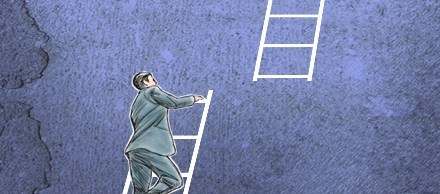 Days of Our Work Lives
Part II: Susan's Saga
Days of Our Work Lives
Part II: Susan's Saga Episode 15When is Good Good Enough?
In the previous episode, Ben helped Susan prepare for her presentation at Rotary. Although it was just a two-minute report from the entertainment committee, she was scared. She had an outsized fear of public speaking and, at age 38, this would be her first real talk to an audience. And it would be 100 people, all of whom knew her, all of whom would remember if she was terrible.
Rory, now the chapter's president, introduced Susan more richly than any committee head had ever been introduced: "Boy, has Susan come a long way from working for me selling fertilizer. She now runs the most important place in Sage River. It's not a cafe. It's the place that makes us all get involved, be better citizens, better human beings: The Town Hall Meeting Cafe."
She looked fondly at Rory although quickly gave Ben a loving look lest either of them got the wrong idea.
After that encomium, the last line of Rory's introduction was comically anti-climatic: "Susan would you give the report from the entertainment committee?"
Susan was much better than she expected. She was natural, she was funny, and she was concise. Her preparation, the paean of an introduction, and periodic glances to Ben and Rory for support buoyed her.
Usually, committee reports are followed, at most, by the speaker's closest friends tepidly clapping. No, Susan didn't get an ovation but the applause meter would have been impressed.
Afterwards, Rory asked her, "How are you?"
Not wanting to respond to his flirtation and having left her fertilizer job because she didn't know Excel, she responded, "Well, I've learned Excel and even QuickBooks."
"Okay, so how'd you like to be our club's next treasurer?"
When you need something done, ask a busy person. And although Susan probably needed to learn to say no to yet another time suck, she said, "I'm flattered. Okay."
"Next, I'm betting you'll be president."
Late that night, Susan and Ben, on the way to bed, stopped in to Adam's room. They often enjoyed taking a moment to look at the dear but active boy finally at rest. But this night, Ben could have no idea what she was thinking:
"I have a good life. I have a good son. I own a good cafe. I have a good boyfriend. I gave a good talk at Rotary; they want me to be treasurer. Everything is good but how do I know if and when good is good enough?"
Next: Part III of The Sapian Family Saga, Adam's Saga. I hope to post episode 1 on Feb 18 in the afternoon.
Published on February 16, 2014 16:05
Susan's Saga: An unvarnished look at work. Episode 15: When is Good Good Enough?
 The Sapian Family Saga
Part II: Susan's Saga
The Sapian Family Saga
Part II: Susan's Saga Episode 15When is Good Good Enough?
In the previous episode, Ben helped Susan prepare for her presentation at Rotary. Although it was just a two-minute report from the entertainment committee, she was scared. She had an outsized fear of public speaking and, at age 38, this would be her first real talk to an audience. And it would be 100 people, all of whom knew her, all of whom would remember if she was terrible.
Rory, now the chapter's president, introduced Susan more richly than any committee head had ever been introduced: "Boy, has Susan come a long way from working for me selling fertilizer. She now runs the most important place in Sage River. It's not a cafe. It's the place that makes us all get involved, be better citizens, better human beings: The Town Hall Meeting Cafe."
She looked fondly at Rory although quickly gave Ben a loving look lest either of them got the wrong idea.
After that encomium, the last line of Rory's introduction was comically anti-climatic: "Susan would you give the report from the entertainment committee?"
Susan was much better than she expected. She was natural, she was funny, and she was concise. Her preparation, the paean of an introduction, and periodic glances to Ben and Rory for support buoyed her.
Usually, committee reports are followed, at most, by the speaker's closest friends tepidly clapping. No, Susan didn't get an ovation but the applause meter would have been impressed.
Afterwards, Rory asked her, "How are you?"
Not wanting to respond to his flirtation and having left her fertilizer job because she didn't know Excel, she responded, "Well, I've learned Excel and even QuickBooks."
"Okay, so how'd you like to be our club's next treasurer?"
When you need something done, ask a busy person. And although Susan probably needed to learn to say no to yet another time suck, she said, "I'm flattered. Okay."
"Next, I'm betting you'll be president."
Late that night, Susan and Ben, on the way to bed, stopped in to Adam's room. They often enjoyed taking a moment to look at the dear but active boy finally at rest. But this night, Ben could have no idea what she was thinking:
"I have a good life. I have a good son. I own a good cafe. I have a good boyfriend. I gave a good talk at Rotary; they want me to be treasurer. Everything is good but how do I know if and when good is good enough?"
Next: Part III of The Sapian Family Saga, Adam's Saga. I hope to post episode 1 tomorrow morning.
Published on February 16, 2014 16:05
Days of Our Work Lives: An unvarnished look at work today: Part II: Susan's Saga. Episode 14: Owning a Cafe
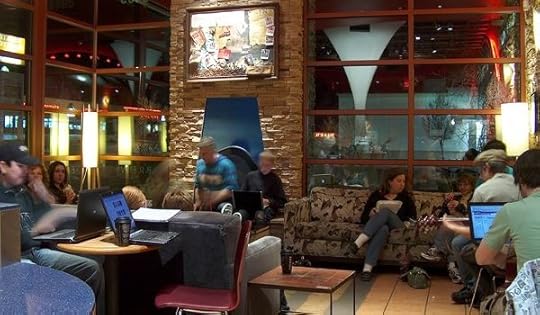
Days of Our Work Lives Part II: Susan's Saga
Episode 14Owning a Cafe
In the previous episode, Susan and Ben decided to open the Town Hall Meeting cafe.
And they did. Six months later, it was neither as successful and fun as they had hoped nor as cataclysmic as they had feared.
On the upside, business was decent from Day One and had grown steadily--they were on track to netting $90,000 the first year.
Not only was the concept of hourly discussions during the day and low-key entertainment at night popular, the weekly guest baker making their signature pastry each week kept things (ahem) fresh. In fact, the state's leading artisan bakers were lobbying for the opportunity. We all like to be selected.
And Susan and Ben were glad they had held out for the dream location--where there was lots of foot-traffic and easy parking day and night, just steps from the only supermarket and only movie theater in town.
And of course they felt good about having built something: They created the cafe, are making hundreds of people happy every week, they created jobs, decent jobs, enabling four other people to make a reasonable living, while being treated as human beings.
But there were downsides. Before opening, they benchmarked against three successful cafes and three that were closing down. A key difference: a beautiful room: lots of expensive wood, wall coverings, lighting, etc., all understated but all costly. So even though they saved a fortune by buying a failing coffee shop and they used friends to help with the build-out, after all the upgrades the city, county, and state required, it cost them $150,000 to open the cafe. Maxing new credit cards was far from enough. They did have to borrow from Susan's parents.
That bothered them far less than the fact that they already had to fire three workers. Although Susan and Ben felt they treated their workers like family, two of them just were unreliable. They often called in sick, almost assuredly because of their substance abuse problem. Often, Susan and Ben couldn't find a sub and had to cover for them--nights, weekends. They were working 70 hours most weeks.
Most painful to them was that one worker was stealing from the till---on a regular basis--starting at the very beginning, when everyone knew how scared and struggling Susan and Ben were. It made it hard to still believe what they were taught in the Small Business Administration course: "Treat your workers well and they'll treat you well."
Personally, Ben and Susan were also a mixed bag. Despite the pressures of their business, they nearly always got along, laughing far more than fighting. They both were low-maintenance, rarely in bad moods. And as they had felt from their first meeting, they were simply compatible: everything from their energy level to their intelligence to their quick pace of walking.
Ben had become great buds with Adam, often going on long hikes with Casanova the dog, searching for "treasure" in the forest. Even more, Adam liked when Ben let him, now 8, help in the cafe. The customers loved it when little Adam would take the tongs that were bigger than him to reach a pastry, put it on the plate, hand it to the customer and say, "That'll be $1.95." One customer asked Susan, "Aren't you violating child labor laws?" She said, "If there's a law against making my son this happy, I'll break it."
On the downside, Ben's ex-wife Vanessa had now gone to court to get an increase in her alimony, arguing that Ben now was making more money. It weighed on Ben. Another part of the marriage's legacy was that Ben every Saturday went to Spokane to see his two-year-old child. If he was really being honest with himself, he did it out of obligation not love. He and Vanessa broke up while she was pregnant, and it wasn't even Ben's biologically. His sperm wasn't up to the task so Vanessa had gotten pregnant by artificial insemination. In short, Ben had little connection to the two-year-old, biological or environmental. But society says he's the father with all the obligations appertaining thereto, so he trekked every week to Spokane to comply with the court order even though he'd much rather be with Susan, with Adam, and their business.
I'd be remiss if I didn't also mention that while Susan and Ben's sex life was good, it already was declining, and they didn't think it was the pressure of the business and from Vanessa. They felt it just was what happens to most couples after a few months. One night, by the fire, Ben lamented, "I guess the old saw is true. If you put a penny into a jar every time you have sex the first year, and take one out every time you have sex after that, the jar will never empty."
Susan needed to change the topic. "I'm scared about my talk at Rotary. I know it's only a 2-minute report from the entertainment committee but..."
Ben understood. He used to be afraid to speak up at meetings but having joined Toastmasters and reading articles on public speaking, he was much better. He was tempted to launch into a long lecture but knew that Susan, like most people, get overwhelmed with too much input, so he just said,
"For someone who's scared of speaking, it makes sense to write it all out, read it three times, then reduce it to a few bullet points on one index card. If you try to memorize it, it will unavoidably sound stilted and if you mess up, which almost everyone does when trying to give a talk memorized, you could get thrown off. Second, when you get up there, focus your eyes mainly on one or two people you know like you. You'll feel the love."
"Ben, would you come?"
"Of course, and I'll sit where most right-handed speakers focus their eyes: a few rows back and just to the right of center."
"Thank you."
"Susan, and the most important thing? You needn't be perfect; you need be authentic. So just pretend you're talking to me after we've had a glass of wine. Conversational, relaxed, informal."
"I'll try." Susan said.
The next and final episode is HERE.
Then I'll start on Part III of The Sapian Family Saga: Adam's Saga.
Published on February 16, 2014 09:54
Marty Nemko's Blog
- Marty Nemko's profile
- 4 followers
Marty Nemko isn't a Goodreads Author
(yet),
but they
do have a blog,
so here are some recent posts imported from
their feed.



